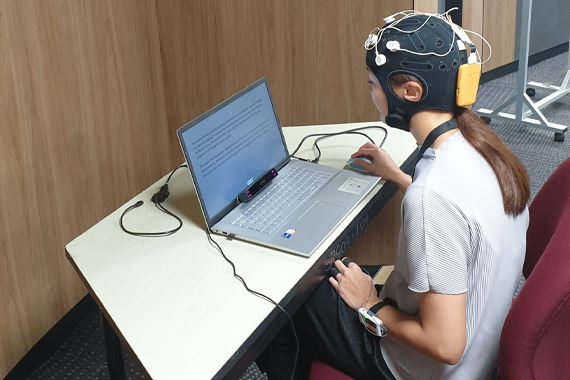INTEGRATED RESEARCH SOLUTIONS
IPS Social Lab works closely with our clients to plan and determine the research goals of each project. Our studies are guided by robust methodological designs and advanced statistical principles and analyses. We have the capability to collect data using multiple platforms depending on the complexity and needs of the research. We constantly explore new technologies to enhance fieldwork efficiency and ensure data integrity.
IPS Social Lab manages the entire lifecycle of a research undertaking. This includes the distribution of research findings and data to relevant stakeholders, and the management of communication tools like press releases, where necessary. Today, Social Lab is the first and the only agency among all universities in Singapore that has attained the ISO certification for fieldwork operations.
EMPHASIS ON DATA QUALITY CONTROL
IPS Social Lab emphasises data integrity and quality control. Quality control in survey research ensures that the survey results are accurate, reliable and valid. Our quality control measures span the entire survey research process.
SAMPLING
In general, sampling methods can be differentiated between probability sampling and non-probability sampling. In probability sampling, every element in the population has a known and non-zero probability of being selected into the sample. An example is random household sampling, where each household unit has a known and equal chance of being selected. In non-probability sampling, participants are selected into the sample in a non-random manner, where each element has an unknown probability of being selected. Some examples include quota sampling, snowball sampling and convenience sampling. The choice of sampling method depends on the goals of the research, its context as well as target respondents and the resources available. These factors should also inform choices in the mode of data collection, e.g., face-to-face interviews, Computer Assisted Telephone Interview (CATI), or online surveys.
INTERVIEWS
Interviewers that conduct surveys are adequately trained, especially in terms of their behaviour (e.g., tone, verbal language, body language) when executing the surveys, which plays a significant role in affecting how respondents answer questions. We go a step further to conduct onsite validation and fieldwork observations to ensure that interviewers perform to our required standards. Data verification is also performed to ensure that respondents provided true and accurate data. This is performed by a separate and independent team to ensure objectivity in the process as well as detect and reject any fraudulent data.
DATA ANALYTICS
IPS applies advanced multivariate data science in all our research. The analyses range from top-line visualisation, to variable-centred analysis, and person-centred studies. Such analysis is adjusted to fit the research objective and combines the latest techniques in survey research.
QUALITATIVE METHODS: IN-DEPTH INTERVIEWS, FOCUS GROUPS AND ETHNOGRAPHIES
To extract deeper meanings and to understand everyday experiences in context, IPS Social Lab has a team of researchers who are trained in qualitative methodologies including in-depth interviews, focus groups and ethnographies. Such qualitative methodologies enable researchers and policymakers to better understand the reasons behind social behaviours, and can provide deeper explanations for any phenomenon observed through survey data. Furthermore, such qualitative methodologies can help mitigate any social desirability bias from survey respondents, providing a fuller, more valid picture of findings to help inform strategy or policy interventions. In an age where digital transformations have made profound impacts in society, conducting ethnography in the digital realm is also a rapidly growing field. Indeed, digital transformations are not simply about the hardware, but people’s changing relationship with it as organizations and institutions transform their strategies and operations to integrate different technologies. In this regard, our researchers are equipped with cutting edge research methods in digital ethnography to investigate people’s behaviours and relationships more comprehensively in our constantly evolving society.
POPULATION-BASED SURVEY EXPERIMENTS
Social Lab constantly experiments with new research capabilities for generating policy insights. One of the most incisive tools is the use of population-based online surveys. This involves the use of survey experiments, including gamification and interactive designs for immersivity, which are carefully embedded within large-N surveys conducted online. Through population-based survey experiments, researchers will be able to establish causal relationships between variables of interests, while more importantly, maintaining the external validity of the survey design. The use of gamification tools embedded within survey experiments also allow researchers to investigate respondents’ attitudes and opinions more accurately, with less response bias particularly in surveys on sensitive topics.

ADVANCING BEHAVIOURAL RESEARCH THROUGH BIOMETRIC SENSORS
To achieve comprehensive and high quality data, Social Lab adopts the use of cutting edge biometric sensors – including eye tracking and facial expression analyses – across the research process. These biometric sensors allow our researchers to more creatively, and comprehensively, investigate social issues and public opinion of significance. For example, these sensors provide an additional source of data on implicit attitudes that can be cross-analysed with explicit responses based on self-report instruments. Moreover, the use of such technologies also allow Social Lab researchers to achieve new breakthroughs in research methods, especially in instrument design and data quality assurance. For example, biometric sensors provide additional indicators that can inform researchers about participants’ attention to and engagement with study instruments, so as to allow researchers to better design materials that optimize quality participation.
